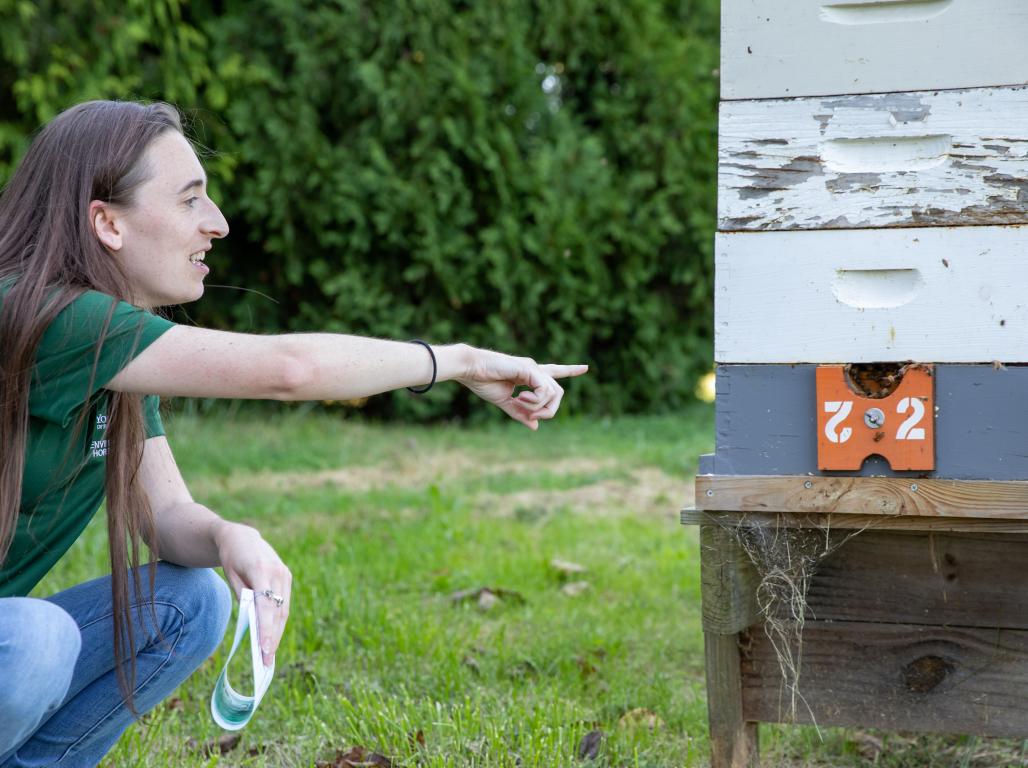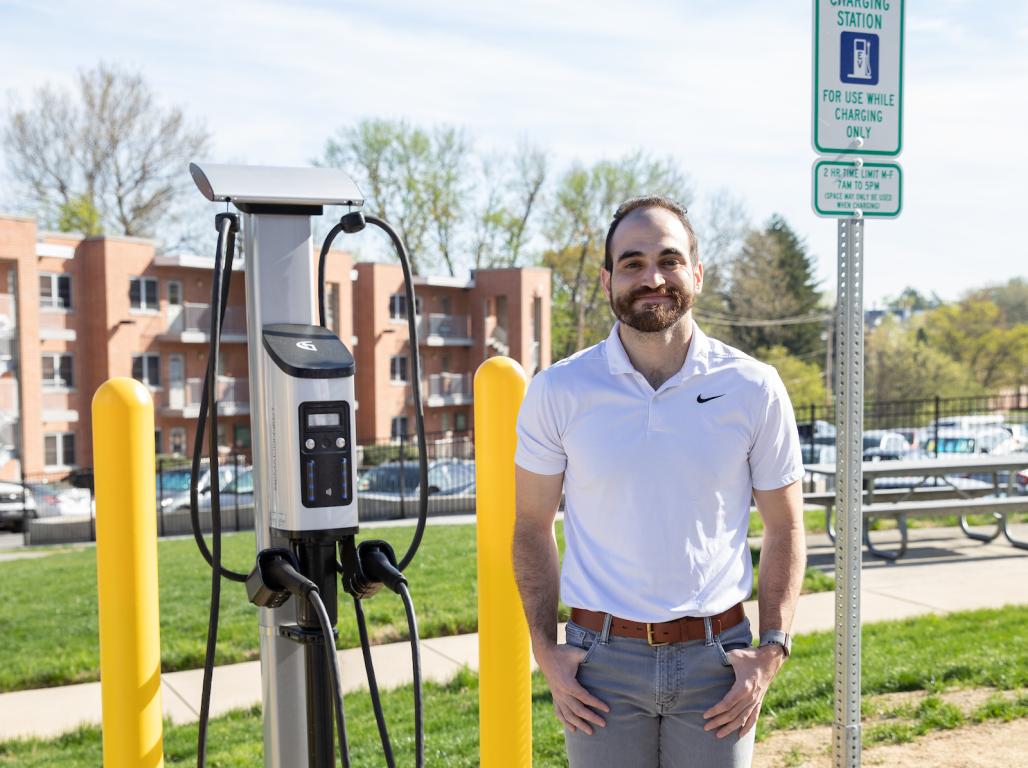Environmental and Sustainability Studies

Program Type
B.A.
Est. Time to Complete
4 Years
School
School of the Arts, Humanities, Education, and Social Sciences
Delivery Mode
On Campus

Pursue A Career Designed for Impact
York College of Pennsylvania’s innovative Bachelor of Arts (BA) in Environmental and Sustainability Studies degree program bridges the gap between a high-impact scientific background and an examination of the change-making, human-based policies and processes that bring the science of sustainability to life.
The global environment is changing, inching closer to a tipping point. Increasing efforts to find creative, sustainable solutions to protect Earth’s climate and resources will task international organizations, governments, businesses, and individuals to draw from the expertise of scientists — but just as important, they'll also need skilled thinkers and policymakers.
As a student in our environmental science and sustainability program, you’ll become prepared to do the valuable work of managing projects, persuading audiences, and making a real difference on whatever level you choose. Whether you are driven to a career path in local organic farming, regional waterways, or tackling national legislation, the BA in Environmental and Sustainability studies ensures you’ll be able to expertly study an ecosystem and inspire others to protect it.
About the BA in Environmental and Sustainability Studies
Environmental Sustainability Degree Requirements
Students in the bachelor’s in Environmental and Sustainability Studies degree program complete a balanced curriculum consisting of core physical science topics, sociology, philosophy, and history studies contributing to theories of sustainability and applied learning opportunities.
Courses in the BA in Environmental and Sustainability include:
- PHL 240: Environmental Ethics
- LIT 379: Literature and the Environment
- SOC 301: Environmental Justice
- HIS 387: North American Environmental History
- SES 491: Internship in Sustainability and Environmental Studies
Through additional elective courses, students adapt their course of study to specific career interests. The variety of these sustainability courses illustrates the forward-thinking, interdisciplinary approach of our program.
- ECO 315: Environmental and Natural Resource Economics
- G 331: Urban Land Use and Sustainability
- PS 327: Environmental Law
- LIT 370: Literature and the Environment
- WRT 321: Accessibility and Usability Research
In addition to Environmental and Sustainability Studies major requirements, students take a number of free electives and complete Foundations general education requirements.
Apply to the BA in Environmental and Sustainability Studies
York College of Pennsylvania’s BA in Environmental and Sustainability Studies degree program allows students to develop skills in a range of disciplines in preparation for the diverse career pathways approaching the issues of global climate change.
If you’re ready to begin or progress a career dedicated to the beautiful world around us, review York College of Pennsylvania Admissions information.
Earning a degree in Environmental and Sustainability Studies can position students for a multitude of fulfilling career paths. Of the many career opportunities in Environmental and Sustainability here are a few:
- Sustainability Officer
- Policy Advisor
- Sustainability Consultant
- Climate Change Analyst
Applied Experience in Sustainability and Conservation
Each Environmental and Sustainability Studies major participates hands-on in the expansion of knowledge about how human systems interact, shape, and change the physical world. From project-based course components to professional work experiences like internships and co-ops, students will develop their experience and expertise in their desired career field.
Built-in Fieldwork
As part of the regular bachelor’s in Environmental and Sustainability Studies coursework, students complete in-field projects. Fieldwork projects expose students to imperative technical aspects of environmental science and demonstrate a level of specialized experience to future employers and graduate programs. You might complete projects in branches of sustainability such as:
- Streambed and wetland remediation
- Watershed mapping
- Erosion mitigation
- Urban light pollution
- Sustainable organic agriculture
Learn all about project- and community-based learning at York College of Pennsylvania
Environmental Studies and Sustainability Internships
Each student in the BA in Environmental Studies and Sustainability degree program has the choice to participate in an internship or independent study — and the nature of your work experience will depend on your personal interests and career goals.
In a field as far-reaching as environmental studies and sustainability, the kinds of internships our students complete can range from business development and public relations to policy writing and community organizing. Past students have interned in settings such as:
- Local organic farms
- Environmental organizations
- Governmental departments
- Local non-profits
Review the events and services the Career Development Center provides for students interested in applying for internships.
Study and Work Abroad
York College of Pennsylvania offers extensive opportunities to study and complete fieldwork around the world. There are regular opportunities for course-related travel during the semester as well as study abroad opportunities during the January and summer terms.
Students in the Environmental and Sustainability Studies major have traveled to study the cloud forest in Costa Rica for a course linking the science of climate change to local contexts and responses. Other locations for study abroad include:
- India
- Turkey
- Greece
- Australia
- Peru
For truly global issues like climate change and sustainability, we understand the importance of preparing students to pursue their careers with an understanding and awareness that transcends borders.
Explore the various student travel programs facilitated by the Study Abroad Center.
Mentorship and Research Opportunities
As a student in the Bachelor of Arts in Environmental and Sustainability Studies degree program, you’ll have unrivaled opportunities to conduct research as an undergraduate and further tailor your experiences to benefit your future career.
Professors work closely with students to develop successful and meaningful research projects, and our on-campus student associations offer ways to connect with peers from different disciplines for a common goal.
In addition to in-field projects, environmental and sustainability studies majors can choose to hone their research and writing skills through self-designed research projects or by partnering with York faculty to assist them on their research agendas.
Both the optional independent study and student-created research initiatives are guided by experienced and knowledgeable faculty members. Research projects in the past have focused on:
- Solar energy
- Farm-to-market agriculture
- Green marketing
- Promotion of public transportation
Learn more about undergraduate research initiatives at York of PA.
Student Organizations
At York College, sustainability is an ever-growing focus of our campus culture. A number of student organizations are involved with on-campus sustainability efforts, like the Spartans for Sustainability and the President's Task Force for Campus Sustainability (PTFCS).
Additionally, the Student Senate includes an Environmental Campus Climate committee, perfect for students interested in learning about politics and policy.
Develop Skills for Careers in Environmental Studies and Sustainability
In-field and research projects, as well as well-rounded coursework, prepare our students for careers in a variety of green sectors, as well as advanced research, education, and advocacy careers focused on environmental and sustainability issues.
Whether you’re passionate about renewable energy, policy, agriculture, or environmental remediation, gain key interdisciplinary skills including:
- Environmental policy analysis skills informing development of frameworks and ability to follow local and national regulations
- Ability to understand and apply scientific concepts surrounding ecological systems, climate change, and natural resource management
- Foundations in communication and critical thinking skills enabling professional advisement of how sustainable practices can be implemented in business, engineering, agriculture, and other sectors
- How to integrate approaches from multiple disciplines including natural science, social science, and the humanities, into sustainable development projects at any scale
- Research and quantitative analysis abilities for understanding and developing cutting-edge scholarship
Best Minors for Environmental and Sustainability Studies Minors
Tailor your skills and further your career opportunities in the dynamic fields of environmental studies and sustainability with one of York’s minor programs.
Environmental and Sustainability Studies Courses
Your class schedule will include core courses for your major, Gen Next general education classes, and electives.
| Course Name | Course Code | Credits |
|---|---|---|
| Environmental Ethics | PHL 240 | 3 credits |
| Literature and the Environment | LIT 379 | 3 credits |
| Environmental Justice | SOC 301 | 3 credits |
| North American Environmental History | HIS 387 | 3 credits |
| Internship in Sustainability and Environmental Studies | SES 491 | 3 credits |
Careers in Environmental and Sustainability Studies
These are just a few of the many career opportunities graduates of the Environmental and Sustainability Studies degree may find:
Sustainability Officer
Policy Advisor
Sustainability Consultant
Climate Change Analyst
Community Organizer
Agricultural Specialist
Frequently Asked Questions
An environmental sustainability degree is one that focuses on the study of environmental and scientific principles as well as sustainability issues. Often intended to prepare students for careers focusing on policy and organizational management, environmental sustainability bachelor’s degrees encompass curriculum topics such as renewable energy, conservation, sustainable agriculture, climate change, and more.
Graduates of a bachelor’s degree in environmental studies and sustainability may pursue careers or further study to effect change in non-profit organizations, private businesses, consulting firms, government agencies, academic institutions, and other settings.
Various careers popular in this field include renewable energy analysts, sustainability consultants, environmental policy analysts, and more. It can be the foundation for careers in environmental education, fundraising, outreach, or lead to advanced careers in environmental policy after further study and experience.
A sustainability consultant is a professional who helps organizations and businesses implement environmentally responsible practices and reduce their carbon footprint. To become a sustainability consultant, you typically need a bachelor’s or master’s degree in a related field, such as environmental science, sustainability, or business, or have relevant work experience. There are some certification organizations in the field, such as the International Society for Sustainability Professionals (ISSP).

Build your dream career, one day at a time.
This is day one. From your first semester on campus through graduation day, York College offers expert advice, professional development opportunities, and personalized support to help you navigate the choices that influence your future.
Explore resources for a successful college experience:
Meet the Faculty
View All FacultyEnvironmental and Sustainability Studies in Action
View All NewsRelated Programs
Environmental Horticulture
The Appell Environmental Horticulture Program (Bachelor of Science) at York College of Pennsylvania immerses students in the science and the business of growing and using plants while responsibly caring for the world’s soil, air, and water resources. As an Environmental Horticulture major, you’ll complete hands-on learning opportunities in the classroom, greenhouse, and laboratory. You won’t just learn how to maximize crop yields; you’ll become equipped to contribute to global change through real-world research projects and a 50-acre horticultural learning lab.
Environmental Science
Environmental science focuses on the ways humans interact with their environment, and how that interaction affects the world around us. The role of the environmental scientist is to use scientific knowledge to address issues in agriculture, forestry, environmental policy, sustainability, and public health initiatives. As you earn your degree in Environmental Science from York College, you’ll develop a fundamental understanding of all the basic sciences: biology, ecology, chemistry, and physics. With a stream running through campus; local access to lakes, wetlands, fields, and forests; and state-of-the-art equipment in the Naylor Ecological Sciences Center, you’ll get hands-on experience with projects in both the lab and the real world.
Political Science
We like to think of political science as a way to deal with two perennial questions: Who governs? And to what ends? You’ll study the formal and informal political processes that shape public policy. You’ll examine the human side and the scientific side of political behavior. You’ll be able to make informed decisions about community politics, electoral politics, and advocacy. Put that all together, and you’re well positioned as a graduate with valuable skills in understanding complex systems and relationships as well as having political fluency. Internships with government agencies, political parties, law firms, nonprofits and more give our students hands-on experience. And with diverse, challenging courses in law, international and domestic policy, Constitutional thought, and more, you’ll have a well-rounded education.







